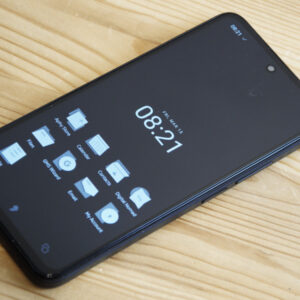
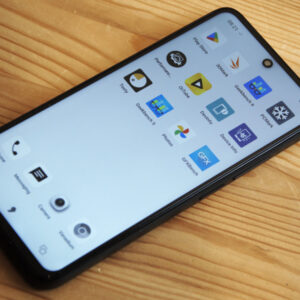
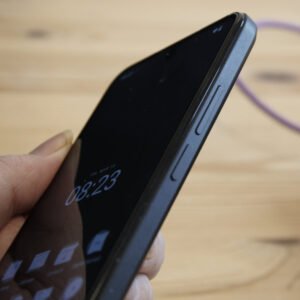
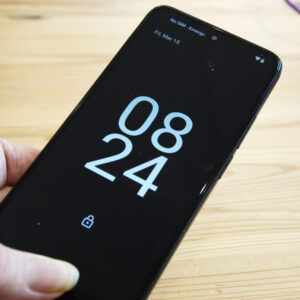
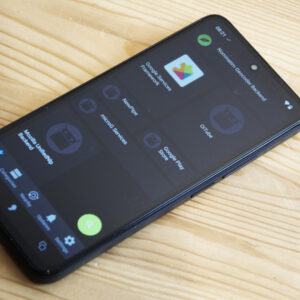
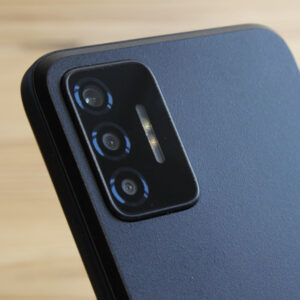
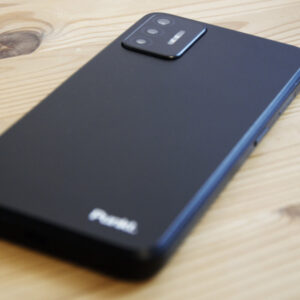

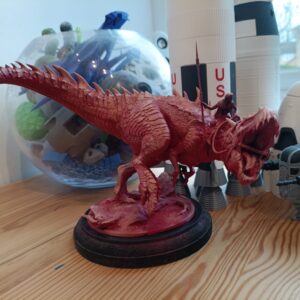




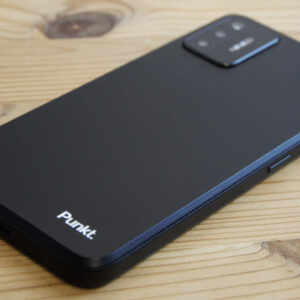
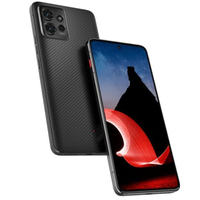

Punkt. MC02: 30-second review
Since Blackberry and Microsoft exited the mobile phone space, there are effectively two choices of phone platforms, from Apple and Google.
The lack of choice that polarisation has produced irks some people, and those are the customers that Punkt. are interested in with the MC02.
A conventional smartphone design that uses the MediaTek Dimensity 900 processor and offers 5G comms alongside WiFi.
What Punkt. claims that this is a revolutionary phone that allows you to control what happens to your private data, not Google or anyone else. To deliver this objective, the Apostrophy OS
comes with its calendar, contacts and mail tools. Data from these is funnelled over secure VPN pathways to a central storage facility in Switzerland.
How you feel about Switzerland might not sync with that level of trust, but that’s the only geographic option for Punkt. MC02 purchasers.
However, more of an issue for buyers is how to integrate the data on the phone with the rest of your digital ecosystem. In short, you don’t. It is possible to install the Google Play store and then apps from that source, and they’re sandboxed by the system to keep the system safe from them. However, without these, the MC02 lacks the ability to access data from multiple clients since only this phone currently runs Apostrophy OS.
That’s fine if you never share pictures, contacts, or emails, but it’s less wonderful if you do.
But the feature that might be the deal-breaker here is that while the first year of access to Apostrophy OS is free after purchasing the phone, beyond that timeframe, the cost is 15 Swiss francs per month for the joy of having your data live in the Alpine pastures and not being sold by Google along with everyone else’s.
When that’s factored into the $750 price tag for purchase, the cost of enhanced security appears to be on the high side for those who aren’t Swiss bankers.
Punkt. MC02: price and availability
- How much does it cost? From $750, €700
- When is it out? Now
- Where can you get it? Direct from Punkt.
There is only one colour (black) and one specification of MC02, and this is exclusively available to order from Punkt. The asking price is a sobering $749 for US customers and €699 for those living in the EU.
Compared to another phone design with the same SoC, the Doogee V30, the cost difference is stark. That phone costs around $299, is waterproof, has double the RAM, storage and battery, and has a 108MP camera sensor.
Therefore, unless you consider the MC02’s security features worth $450 or more, this might not be the best value available.
- Value score: 3/5
Punkt. MC02: Specs
| CPU: | MediaTek Dimensity 900 |
| GPU: | Mali-G68 MC4 |
| RAM: | 6GB LPDDR4X |
| Storage: | 128GB UFS 2.2 |
| Screen(s): | 6.67-inch IPS 60Hz 400nits |
| Resolution: | 2400 x 1080 |
| SIM: | Dual Nano SIM (or one SIM and MicroSD) |
| Weight: | 230g |
| Dimensions: | 165.9 x 77.8 x 10.9mm |
| Rugged Spec: | N/A |
| Rear cameras: | 64MP Main, 8MP Ultrawide, 2MP Macro |
| Front camera: | 24MP |
| Networking: | WiFi 6, Bluetooth 5.2 |
| OS: | Apostrophy OS |
| Battery: | 5500mAh (Max charge 33W), 18W wireless charging |
| Colours: | Black |
| Warranty: | 2 years |
Punkt. MC02: design
- Simple
- Mono-interface
- Less is less
The whole Punkt. ethos from its beginnings has been to reduce technology to the bits people genuinely want. While the MC02 doesn’t go as far as its previous MP01 or MP02, this phone is relatively difficult to describe based purely on notable external features.
The MC02 is a black slab of impact-resistant plastic and glass with a USB-C port on the bottom, a power and volume rocker on the right, a custom button and SIM card slot on the right, and a 2.5mm audio jack on the top.
On the back is the Punkt. logo in the bottom right and the camera cluster on the top left, with the vast majority of the underside being a flat textured surface created specifically for wireless charging.
This design is dominated by the 6.67-inch IPS panel, which doesn’t include a fingerprint sensor and only offers 60Hz operations. With the default configuration, one might wonder if the screen is monochromatic since all the standard icons are shades of black and white.
This is an illusion since once you start installing apps that aren’t for Punkt. branded apps, you realise that the screen is indeed colour, and this was a design statement perhaps to make you less interested in looking at the phone.
This might make more sense if it had a mono screen, as significant power saving might be possible with fewer LCD layers, but that’s not the objective here.
Punkt. doesn’t mention phone durability at all in its information. Therefore, it’s probably inadvisable to get it wet, dusty or drop it. The warranty period is also only two years, less than we’ve seen from other phone makers.
Overall, from the outside, considering the relatively high cost of this device, the MC02 is rather dull.
Design score: 3/5
Punkt. MC02: hardware
- Dimensity 900
- Only 60Hz screen
- Modest battery
This isn’t the first phone we’ve reviewed that uses the Dimensity 900. Previously, at Tech Radar Pro, we saw this SoC on the Doogee V30 and the Ulefone Armor 18T. The same chip is also used in a large number of Chinese-made devices, including Honor, Vivo, OnePlus, Oppo, Infinix and Coolpad, to mention but a few.
It should be noted that the vast majority of these phones cost less than $400, with some less than $200, and many come with 8GB of memory and 256GB of storage even at those prices.
As SoC go, the Dimensity 900 is a middle-order processor that has been superseded by later Dimensity designs since it was first introduced in 2021.
It’s selling points are a well-balanced combination of performance and efficiency cores, a decent GPU in the Mali-G68 MC4 and an integrated mobile modem that supports both older GSM technology along with newer 4G and 5G comms.
One slight disappointment is the screen. IPS panels of this resolution are very common these days for phones of this scale, but on the better devices, they generally offer 120Hz playback and more than 450 nits of brightness. The 60Hz and 400 nits brightness hints that this hardware selection was a cost-driven exercise above all else.
The final element, excluding the cameras we’ll talk about next, is the battery. In some circles, a 5500mAh battery might be plenty, but it’s not large by current standards. It is sufficient for a day’s normal use, but it won’t be enough to keep the phone alive over multiple days should charging not be available.
And, the phone does support wireless charging even if it isn’t supplied with one.
What might have been good to see in this phone might have been eSIMs, but Punkt. went with the typical dual-SIM model where you are forced to sacrifice one of those to use a MicroSD card. Given the limited storage provided eSIM might have been a way to mitigate that, but that opportunity wasn’t embraced.
To put it bluntly, the MC02 has the internal hardware that we’d expect to see in a $300 phone, not one costing twice that amount or more.
- Hardware score: 3.5/5
Punkt. MC02: cameras
- 64MP Main sensor
- 8MP Ultrawide
- 4K video recording
The Punkt. MC02 has four cameras:
Curiously, Punkt. is somewhat tight-lipped about what camera sensors are in this phone.
What we know is that the primary sensor is 64MP and that it is supported by an 8MP ultra-wide and a 2MP macro lens. Our guess, and it is only that because the phone obscures the true information from device information apps, is that the rear sensor set is from OmniVision.
Possibly the 64MP OmniVision ov64b40 and 8MP OmniVision ov08d10, but we can’t guarantee that. The front-facing sensor is rated as 24MP, which hints it might be a Samsung design since they offer one with these specs.
These sensors take acceptable but hardly stunning images, and the main sensor doesn’t adapt to less-than-ideal lighting conditions sufficiently.
That’s not a huge issue, as this isn’t a phone that most people would buy for its photo-taking skills, but like most of the other hardware aspects, the cameras on the MC02 are somewhat mediocre.
The best thing about the primary camera is that it supports 4K video capture, but it doesn’t allow for the control of the frame rate. The snag with 4K video is that it takes up considerable space and Punkt. decided that 128GB of storage was enough.
One ironic feature of the video system is that this phone doesn’t support Widevine L1 encryption, the technology streaming services use to protect their content. That probably means that getting better than 480p resolution streams from some services isn’t possible.
Punkt. MC02 Camera samples
- Camera score: 4/5
Punkt. MC02: performance
- Mediocre SoC
- Two days on battery
| Phone | Header Cell – Column 1 | Punkt. MC02 | Doogee V30 |
|---|---|---|---|
| SoC | Row 0 – Cell 1 | Dimensity 900 | Dimensity 900 |
| Memory | Row 1 – Cell 1 | 6GB/128GB | 8GB/256GB |
| GeekBench | Single | 686 | 694 |
| Row 3 – Cell 0 | Multi | 2107 | 2108 |
| Row 4 – Cell 0 | OpenCL | 2531 | 2588 |
| PCMark10 | Score | 10257 | 10005 |
| Passmark | Score | 10388 | 10737 |
| Row 7 – Cell 0 | CPU | 5337 | 5281 |
| 3DMark | Slingshot OGL | 5160 | 5165 |
| Row 9 – Cell 0 | Slingshot Ex. OGL | 4049 | 4033 |
| Row 10 – Cell 0 | Slingshot Ex. Vulkan | 3814 | 3829 |
| Row 11 – Cell 0 | Wildlife | 2177 | 2187 |
What these benchmarks reveal is that the Apostrophy OS can eek no more performance out of the Dimensity 900 than the one used by Doogee. In fact, if anything, the security model run by this phone may slow it down a little.
One test we left out of our table was the PCMark Work 3.0 battery life test, where the MC02 managed a respectable 19 hours and 39 minutes on a full charge. That hints that the phone might last at least two days of use without recharging, which is fine for a phone that only weighs 230g.
It wasn’t fair to compare the battery life with the V30 since it has a 10800mAh battery, almost double that of the MC02.
Overall, this phone performs fine, but it’s hardly anything to write home about.
- Performance score: 3/5
Punkt. MC02: Security
Punkt. makes great efforts to avoid mentioning in its promotional material is the ‘A’ word, in this case that’s Android. A deeper dig reveals that the secure apps, including the Vanadium browser, all came from an Android 13 spur called GrapheneOS. That’s another special version of Android that is a private and secure mobile operating system with Android app compatibility. And, critically, GrapheneOS is open source, which is why some of its components can be used by Apostrophy.
In whatever way Android is sliced and diced, to achieve some degree of Android app compatibility, a subsystem of Android must exist within both GrapheneOS and Apostrophy OS.
Therefore, while the security model used by the MC02 isn’t the same as that offered on the Google Pixel, as an example, it is probably more secure. There is some commonality of code, and that might make an exploit that works on vanilla Android 13 also exploit Apostropy OS.
What makes this less likely is that Punkt. doesn’t bundle the Google framework structures and apps by default, these being the mechanisms that a security breach is most likely to use, making it inherently more secure.
The snag, and it’s a huge one, is that most people buy an Android phone to use those apps and services. We predict the majority of customers for the MC02 are highly likely to add the Google Play store and then treat it like any other Android phone. It’s human nature.
That choice undermines many of the original thinking concepts of Punkt. devices, but for practical reasons.
It’s interesting to note that the first Punkt. phones promoted the idea of making a phone less distracting and giving it only core functionality. But surely, if you don’t want to be tracked by Google or whomever, and you don’t want the world of apps that are there to lure you there, then just buy an old Nokia on eBay. It would be a much less expensive option, and the battery life is incredible.
The phone has a built-in VPN, which is a good feature, but after one year of use, a monthly subscription is required to keep using the Apostrophy services. With this money, you could pay for a VPN subscription and have money left over.
Punkt. MC02: Verdict
It’s easy to understand why people want to disconnect themselves from Apple and Google, but is the MC02 really go-it-alone, or does it only try to wear a veil of independence?
Having used it for a while, I’m still not sure how much of a diversion a phone that uses Android can truly be removed from its Google origins. What calls this into question is that the first thing most people will do with it is to sign in to Google Play to get the apps they need.
The real danger of Android is downloading and installing a rogue application, and that threat isn’t fully exercised by the MC02.
In short, this seems like plenty to spend for those who don’t want a smartphone because it’s a security threat or they don’t want to join the great data generating unwashed.
However Punkt. twists Android in the MC02, it will never be as secure as using either a dumb phone, or no phone at all.
Should I buy a Punkt. MC02?
| Attributes | Notes | Rating |
|---|---|---|
| Value | Security appears to add a significant cost to a modestly specified device | 3/5 |
| Design | Minimalist approach appears low cost and not rugged | 3/5 |
| Hardware | Budget memory and storage sizes, a three-year-old SoC and no e-SIMs. | 3.5/5 |
| Camera | The cameras aren’t anything special, and it lacks Widevine L1 video decryption. | 4/5 |
| Performance | The numbers are largely the same as the much cheaper Doogee V30 | 3/5 |
| Overall | Wants to be outside the Google tent but with a foot inside, confusingly. | 3.5/5 |
Buy it if…
Don’t buy it if…
Also consider
More rugged tech
Need the full kit for out in the field? Here’s what we’ve reviewed so far:
- Best rugged laptops
- Best rugged tablets
- Best rugged hard drives
Source link


No Comment! Be the first one.